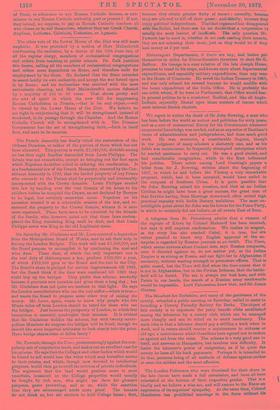Mr. Fawcett, through the Times, protests strongly against the com-
pulsory sale of corporation lands, and makes out an excellent case for his opinion. He says that the Colleges and other bodies which would be forced to' sell would lose the value which may hereafter accrue to their estates, and which, though now devoted to intellectual purposes, would then go to swell the revenue of private individuals. The argument that the land would produce more is moat uncertain, inasmuch as the College properties would usually be bought by rich men, who might use them for pleasure purposes, game preserving, and so on, while the assertion that they are mismanaged needs more proof. The tenants do not think so, but are anxious to hold College farms ; first,
because they obtain greater fixity of tenure ; secondly, because they. ere. allowed to kill off their game ; mud thirdly, because they enjoy political independence. That last argument has disappeared witirthediallot, but there:eau be no dottlit that a corporation is. =ally the most lenient of landlords. The only question Mr. Fawcett has to meet is, whether in sot reek-renting their tenants, they are not misusing their trust, just as they would be if they lent money at 2 per cent.


































 Previous page
Previous page